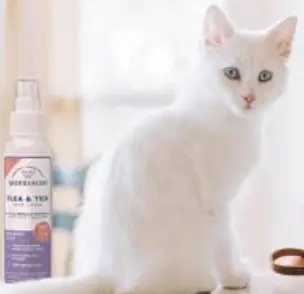Ticks are not just a nuisance; they can be a real threat to a kitten’s health. These tiny parasites latch onto your kitten’s skin, feeding on their blood and potentially causing a host of problems. Finding a tick treatment for kittens can be tricky due to their age, but there are options out there.
What Are The Dangers If You Don’t Use A Tick Treatment For Kittens?
One of the most immediate concerns is anemia. Kittens have small bodies and blood volumes, which mean they can’t afford to lose much blood. With enough ticks, a kitten can become anemic, leading to weakness, paleness, and lethargy.
Tick bites also irritate the skin, causing redness and swelling. In some cases, this irritation can lead to infections if not treated promptly.
Beyond immediate issues, ticks are known carriers of various diseases, some of which can be fatal if not diagnosed and treated early. Conditions like Lyme disease, though less common in kittens, could still pose a significant risk.
Recognizing the signs of tick infestation early is crucial. Look out for excessive scratching, patchy fur, or visible ticks on their skin. Remember, even one or two ticks can quickly multiply if not addressed.
When assessing a kitten’s health, keep an eye out for any changes in behavior or appetite as these could hint at tick-related issues. Being proactive about your kitten’s health helps in catching problems early and seeking treatment promptly.
Safe and Effective Tick Removal Techniques for Kittens
Removing ticks from a kitten needs a steady hand and careful approach. The goal is to extract the tick fully without leaving parts behind.
Using fine-tipped tweezers or a tick removal tool is essential. Grasp the tick as close to the kitten’s skin as possible. Slowly pull straight out without twisting. This reduces the risk of the tick’s head breaking off under the skin.
Tools like tick removal hooks or pens can offer precision, making it easier for pet owners. These tools often come with easy-to-follow instructions, which help maintain a calm, methodical approach.
One common mistake is trying to squeeze the tick’s body, thinking it helps in removal. This can actually push harmful bacteria into the kitten. Patience is key; take your time for a clean removal.
After removing the tick, clean the area with an antiseptic. This helps in soothing any irritation and prevents infection.
Monitor the site over the next few days. Look out for redness or swelling as these might indicate a reaction or infection, needing further attention.
Taking precautions and being careful with your technique not only keeps your kitten comfortable but also ensures that you’re dealing with the issue effectively.
Tick Treatment For Kittens: Best Approaches
Once you’ve managed to remove the ticks, the next step is treating your kitten to ensure it’s free from any remaining parasites and complications.
Several topical treatments are formulated specifically for kittens and can be applied directly to their skin. Always choose products suitable for their age and weight; a vet’s recommendation is invaluable here.
Oral medications are another effective option. These treatments work to kill ticks from the inside out, providing ongoing protection. Again, consulting a veterinarian ensures you’re using the safest and most effective choice for your kitten.
Natural remedies like neem oil or diluted apple cider vinegar provide milder alternatives. While not as potent as pharmaceutical treatments, they can be a supplementary step in keeping ticks away.
Throughout the treatment process, keeping an eye on your kitten’s wellbeing is crucial. Look for any signs of allergic reactions or health changes.
Regular vet check-ups in this period help monitor your kitten’s condition and adjust treatments if needed, ensuring a full recovery from any tick-related health concerns.
Preventative Measures: Keeping Your Kitten Tick-Free
Prevention is always better than cure, and when it comes to ticks, this couldn’t be truer. Implementing a solid preventative plan is crucial in keeping your kitten safe and healthy.
Start with effective preventative products. Collars and topical solutions designed for kittens are widely available and offer dependable protection. Ensure the products are age-appropriate and approved by your vet to avoid any adverse effects.
Managing your home environment plays a significant role. Regular cleaning, especially in areas where your kitten spends the most time, reduces the risk of tick infestations. If your kitten spends time outdoors, keeping the yard tidy by trimming grass and removing leaf piles helps too.
Seasonal changes can affect tick activity levels. It’s wise to stay vigilant during the warmer months when ticks are more active. Regularly check your kitten for ticks, especially around their neck, ears, and under their legs, to catch any uninvited guests early.
Finally, having your vet as a partner in prevention is invaluable. They can provide insights tailored to your kitten’s needs, recommend the best products, and ensure your kitten’s health is always prioritized. With the right preventative steps, you can greatly reduce the chances of a tick problem.
In Conclusion To What Is The Best Tick Treatment For Kittens
Remembering that tick control for kittens is very different than for a cat. Due to the size of kittens, they can’t use the same topical, chemical based products that you can use on cats. When your kitten reaches the age of 8 weeks or more they will be safe to use a cat based tick treatment.
I hope that you found the information here helpful in your fight against ticks on your kitten. If you have any questions about the information we have provided, please leave it in the comments section below. If you have any experience with ticks on kittens 8 weeks or younger, please share your story with us. Your own experience could help others with their fight against ticks on their kittens.
Thank you for visiting Fleas B Gone, have a great day 🙂


